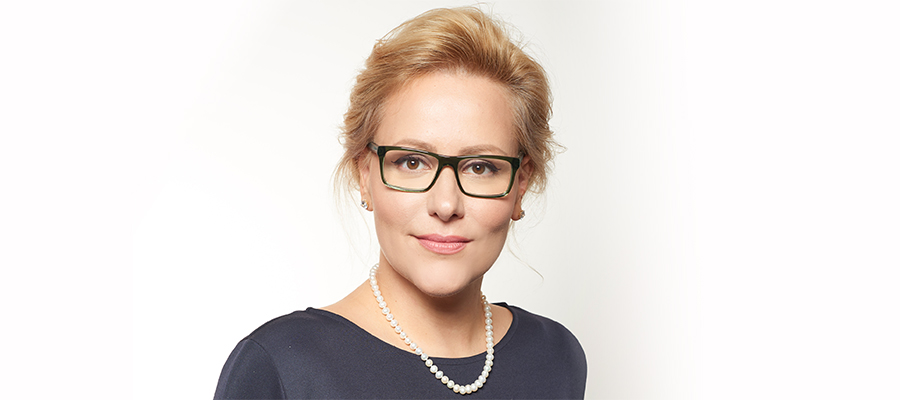Breast Cancer Awareness Month – an interview with Dr Olga Oikonomidou

Dr Olga Oikonomidou is one of the UK’s leading breast cancer academic oncologists based in the Edinburgh hub of the Cancer Research UK Scotland Centre at the Institute of Genetics and Cancer. As part of Breast Cancer Awareness Month, we talk to Olga about why she chose her career path and what her role involves.
From early on in her career, Olga knew she wanted to specialise in breast cancer.
“I come from a family of doctors, and I always knew since I was at primary school that I wanted to become a doctor,” she says. “And long before I even obtained my medical degree, I knew that medical oncology would be the field I would like to pursue a career in.
“During my training in King’s College Hospital in London, I was involved in the care of many breast cancer patients and I realised that breast cancer offers a lot of opportunities for clinical trials and translational research, but also focuses predominantly on women.
“Breast cancer is a rapidly evolving field in oncology with perhaps the most fascinating developments in drugs over the last five years that have significantly changed the treatment landscape and patients’ outcomes.
“I am passionate about my job, and I really love working with my patients. My goal is to make my patients feel that they have a partner during their breast cancer journey and to provide the best possible outcomes with the minimum impact on their quality of life. I treat my patients the way I want to be treated. I understand that they might be scared about their future, might feel angry, depressed, overwhelmed, or powerless. It’s all part of the cancer diagnosis.
“With shared decisions on the treatment pathway, patients get back power at a time when they feel powerless. Patients with breast cancer will face so many changes in their lives including physical, emotional and practical changes, like financial changes, that have a great impact on them and their families, and they need all the support they can get.”
Olga started out doing a degree in Human Genetics followed by a Masters in Oncology and Cellular Pathology and an MRes in Immunology. She then got into medical school and did a PhD in Translational Medicine, after receiving a prestigious PhD fellowship, while doing her medical degree.
Just before completing her medical oncology training at King’s College Hospital, she applied for a Senior Clinical Research Fellow post at the Institute of Genetics and Cancer. She spoke initially to David Cameron and after going through a successful interview process, she was offered the job. She then got a substantive post as an Honorary Consultant, treating patients with breast cancer and soon after was promoted to Senior Clinical Lecturer and started building up a team doing translational research in breast cancer.
Her role as an Academic Consultant Medical Oncologist is split between running a busy breast clinic and leading national and international clinical trials as well as translational research projects.
“The dual role of researcher and clinician is essential in identifying the gaps and unmet needs in breast cancer,” she says. “We are working on a number of translational projects in breast cancer with the main focus being to better understand the biology of breast cancer, identify biomarkers of response to treatment to enable us to determine on an individual basis whether treatment is producing a worthwhile effect. Treatments are not without undue toxicity and continuing with a therapy that is not beneficial reduces the potential to introduce other treatments.
“I feel very privileged to be working at the Institute of Genetics and Cancer surrounded by excellent scientists. The key thing in getting successful outcomes is collaboration and at the IGC, academic clinicians like me have the opportunity to join forces with the scientists to work towards the aim of getting better outcomes and transform lives. I also have the privilege of working with a great group of clinical colleagues at the Western General Hospital which is one of the five centres of excellence for cancer in the UK.”
Olga says awareness-raising events such as Breast Cancer Awareness Month in October are “hugely important”.
“Breast Cancer Awareness Month is an international campaign that aims to promote screening and prevention of the disease. In my opinion, there are four goals: support, education, encouragement and fundraising.
“By support, I mean supporting all patients with breast cancer regardless of whether these are at the early or advanced stage. Education on risk factors is a key thing. Encouragement to pursue regular screening and, of course, fundraising to support research in breast cancer, are both very important. My group has had the privilege of receiving very generous donations over the last eight years that supported our research projects, and I will always be grateful to all our donors.”
Olga is currently involved in a £760,000 collaboration with Nick Leslie from Heriot Watt University which involves a technique that will allow the researchers to diagnose, analyse and characterise tumours much earlier, as well detecting the recurrence of cancer before it’s had a chance to develop and spread.
“We live in the era of personalised medicine and precision oncology,” she says. “We are working closely with the Beatson West of Scotland Cancer Centre in setting up a Molecular Tumour Board in Scotland that will involve a dedicated group of medical experts who will review the molecular profiling results of individual cases and provide personalised treatment opportunities.
“They are all parts of the puzzle and the road from bench to bedside is long but meaningful and impactful. There is only one aim – to improve the treatment landscape, offer patients the best possible treatment with least toxicity, extend their life expectancy and improve their quality of life.”



